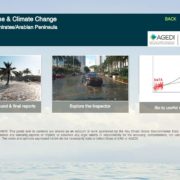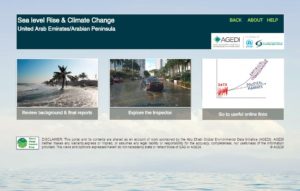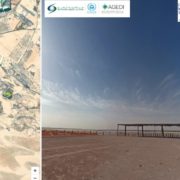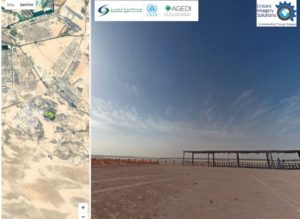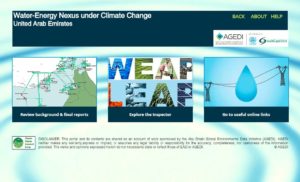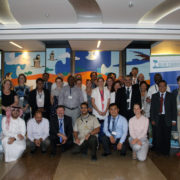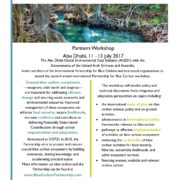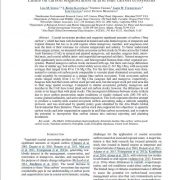What are the costs and benefits of energy efficiency measures in the United Arab Emirates?
/in News /by Bill DoughertyMembers of the International Partnership for Blue Carbon Agree on Future Direction and Activities During its Second Annual Meeting
/in News /by Bill Dougherty– The Abu Dhabi Global Environmental Data Initiative (AGEDI), with the UAE Ministry of Climate Change and Environment and the Australian Government Department of the Environment and Energy, invited the International Partnership for Blue Carbon’s members to attend its second annual meeting –
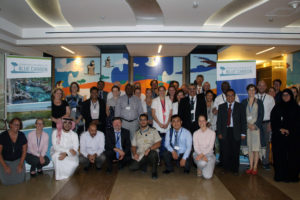
Abu Dhabi, UAE: 18 July 2017 – From Tuesday 11 July to Thursday 13 July 2017, the Abu Dhabi Global Environmental Data Initiative (AGEDI) hosted the second annual meeting of the International Partnership for Blue Carbon. Announced at COP21 in 2015 by the Government of Australia, the partnership is a consortium of governments, non-profit organisations, and intergovernmental agencies who equip policy-makers with actionable information and knowledge of coastal blue carbon ecosystems (mangrove, tidal marsh and seagrass) for climate change mitigation as well as securing social, economic and environmental outcomes.
Improved management of these ecosystems can enhance food security, secure livelihoods, increase resilience and contribute to delivering Nationally Determined Contributions (NDCs) through carbon sequestration and adaptation. The partnership aims to protect and restore coastal blue carbon ecosystems by building awareness, sharing knowledge and accelerating practical action.
“The UAE is taking the lead on researching its rich coastal blue carbon ecosystems. We have about 14,000 hectares of mangroves, extensive salt marshes and seagrass meadows supporting globally significant populations of dugongs” said Ahmed Baharoon, AGEDI’s Acting Director. “AGEDI with support from the Environment Agency – Abu Dhabi (EAD) and in partnership with the UAE’s Ministry of Climate Change & Environment (MoCCaE) are committed to pursuing national, regional and global goals to ensure blue carbon science is at the forefront of the international effort for natural climate change mitigation. Our role in the International Partnership for Blue Carbon is a sign of this commitment.”
The second annual meeting involved policy and technical discussions from mitigation and adaptation perspectives. It took stock of the international state of play on blue carbon science, policy and on-ground activities, discussed advancements in international policy frameworks relevant to blue carbon and looked at innovative financing avenues available to implement activities more effectively. Attendees included members from international organisations, government representatives from Africa, Europe, America and Asia as well as participants from the private sector and NGOs.
“Australia has one of the largest expanses of coastal wetlands in the world. We have a range of policies in place to conserve these ecosystems and the many migratory and threatened species they are home to. This year Australia has also reported on mangroves and tidal marshes in our National Greenhouse Gas Inventory as part of improved emissions reporting. It is important to work together to share our experiences in conserving these important ecosystems, such as through the Partnership,” said a spokesperson for the Australian Government Department of the Environment and Energy.
Engineer Muna Omran Majed Al Shamsi, Acting Director, Biodiversity Department, Ministry of Climate Change and Environment, said: “In the UAE, we have been working extensively in marine resource conservation, sustainable fisheries, aquaculture and research and development. One particular area of focus has been the protection of our blue carbon ecosystems.
We have been working hard with the Environmental Agency Abu Dhabi, and the Abu Dhabi Global Environmental Data Initiative (AGEDI) and relevant entities to assess the carbon reserves that these systems hold. These studies have helped us identify carbon stocks that are extremely valuable, and reinforce the importance of appropriate conservation measures to protect the blue carbon ecosystems. We know that, if destroyed, these ecosystems will release carbon into the atmosphere and contribute to global warming. For example, it takes four decades for newly planted mangroves to mature and sequester the same amount of carbon as mature mangrove forests.
This is why we have highlighted the importance of conserving and protecting blue carbon ecosystems in our NDC, and it is also why we are proud to be part of this initiative.”
For more photos of the workshop click here!
More information on blue carbon, the partnership, the meeting outcomes and future meetings can be found at www.bluecarbonpartnership.org.
Notes to the Editors:
About the Australian Government Department of the Environment and Energy (DoEE)
The Department of the Environment and Energy designs and implements the Australian Government’s policies and programmes to protect and conserve the environment, water and heritage and promote climate action. The environmental framework is being delivered under four pillars: Clean air, clean land, clean water and national heritage. The Department of the Environment and Energy, along with the Australian Government’s Department of Foreign Affairs and Trade, lead Australia’s involvement in the International Partnership for Blue Carbon, including as a member of the Coordinating Group and secretariat functions.
About Abu Dhabi Global Environmental Data Initiative (AGEDI)
Under the guidance and patronage of His Highness Sheikh Khalifa bin Zayed Al Nahyan, President of the United Arab Emirates, the Abu Dhabi Global Environmental Data Initiative (AGEDI) was formed in 2002 to address responses to the critical need for readily accessible, accurate environmental data and information for all those who need it. With the Arab region as a priority area of focus, AGEDI facilitates access to quality environmental data that equips policy-makers with actionable, timely information to inform and guide critical decisions. AGEDI is supported by Environment Agency – Abu Dhabi (EAD) on a local level, and championed by the United Nations Environment Programme (UNEP), regionally and internationally. For more information, visit www.agedi.org
About the UAE Ministry of Climate Change and Environment (MOCCAE)
The Ministry of Climate Change and Environment was established in February 2006 as the Ministry of Environment and Water. The ministry acquired its new name following the UAE Cabinet reshuffle in February 2016 and the subsequent integration of the climate change function. Under its redefined scope, the ministry has taken on a dual mandate. On the national level, the ministry aims to strengthen the UAE’s efforts in preserving the environment and promoting food diversity in accordance with the nation’s aspiration to emerge as a key benchmark for sustainable development. On the global level, the Ministry of Climate Change and Environment will join international stakeholders in combating climate change and profile the UAE’s path-breaking achievements in the sector at thought leadership platforms worldwide.
For further details, please contact us: [email protected].
About Environment Agency – Abu Dhabi (EAD)
Established in 1996, the Environment Agency – Abu Dhabi (EAD) is committed to protecting and enhancing air quality, groundwater as well as the biodiversity of our desert and marine ecosystem. By partnering with other government entities, the private sector, NGOs and global environmental agencies, we embrace international best practice, innovation and hard work to institute effective policy measures. We seek to raise environmental awareness, facilitate sustainable development and ensure environmental issues remain one of the top priorities of our national agenda. www.ead.ae
For media enquiries, please contact:
EAD Press Office:
Environment Agency- Abu Dhabi
Tel: +971 2 693-4637
Mobile: +971 50 442-5096
Email: [email protected]
Website: www.ead.ae or www.agedi.org
Jane Glavan Speaking on the GEF Blue Forests Project
/in News /by Bill DoughertyAGEDI is pleased to share the latest video regarding how Abu Dhabi’s Intervention site supports the GEF Blue Forests Project.
The Blue Forests Project http://www.gefblueforests.org/ aims to address these challenges through coordinated on-the-ground demonstrations where better coastal ecosystem management is achieved by harnessing the values associated with carbon and ecosystem services, addressing key knowledge gaps, and providing experience and tools for greater global application. This four year project is an initiative of the United Nations Environment Programme (UNEP), funded by the Global Environment Facility (GEF) and co-financed by project partners, and managed by GRID-Arendal.
Jane Glavan from AGEDI shares her thoughts on Blue Forests Project from GRID-Arendal on Vimeo.
You are Invited! 2nd International Blue Carbon Partnership Meeting
/in News /by Bill DoughertyThe Abu Dhabi Global Environmental Data Initiative (AGEDI) with the Governments of the United Arab Emirates and Australia, invite members of the International Partnership for Blue Carbon and interested organizations to attend the second annual International Partnership for Blue Carbon workshop.
The workshop will involve policy and technical discussions from mitigation and adaptation perspectives on topics including:
the international state of play on blue carbon science, policy and on-ground activities
advancements in international policy frameworks relevant to blue carbon
pathways to effective implementation of activities on blue carbon ecosystems
evaluating the co-benefits of blue carbon activities for food security, fisheries, sustainable livelihoods, and other ecosystem services
financing avenues available and relevant to blue carbon
Please let us know if you can join us.
Agenda 2nd International Blue Carbon Partnership Meeting (3660 downloads )[email protected] or [email protected] cc: [email protected]
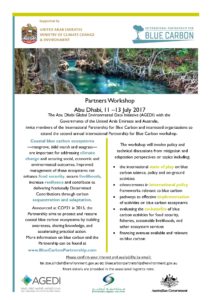
Now Available! Arabic Climate Change Projects Executive Summaries
/in News /by Bill DoughertyWe are extremely pleased to announce that the executive summaries, sea level rise primer and the companion briefings are now all available online through the AGEDI LNRCCP Inspectors!
We hope that you continue to find great value in our Inspectors with all the project data outputs, models, visualisations, animations, maps etc available freely to you.
Now also photos! Regional Climate Change Symposium recordings, presentations and posters online
/in News /by Bill DoughertyNow Online!
We are very pleased to now also share the photos from the symposium. Click here!
We are very pleased to share all the recordings of the presentations of the experts during the symposiums three days, the panel sessions, their presentations as well as the posters made available.
Please don’t forget to also visit the Inspectors Site for all the webinar recordings, technical documents, models, tools, output and input data, visualisations and animations available from each of the 12 sub-projects.
Another Publication now online!
/in News /by Bill DoughertyWe are very pleased to share our Principle Investigators publication released on the findings from our Abu Dhabi Blue Carbon demonstration phase. Congratulations to the team!
Publication: Carbon Storage in Seagrass Beds of Abu Dhabi (4702 downloads )Abstract “Blue Carbon” initiatives have highlighted the significant role of seagrasses in organic carbon (Corg) burial and sequestration. However, global databases on the extent of Cstocks in seagrass ecosystems are largely comprised of studies conducted in monospecific beds from a limited number of regions, thus potentially biasing global estimates. To better characterize carbon stocks in seagrass beds of varying structure and composition, and to further expand the current “Blue Carbon” database to under-represented regions, we evaluate the extent of Corg stocks in the relatively undocumented seagrass meadows of the Arabian Gulf. Surveys were conducted along the coast of Abu Dhabi (UAE) and encompassed sites ranging from sheltered embayments to offshore islands. Seagrass beds consisted of Halodule uninervis, Halophila ovalis and Halophila stipulacea.While seagrasses were widely distributed along the coast, both living and soil Corg stores were relatively modest on an areal basis. Total seagrass biomass ranged from 0.03 to 1.13 Mg C ha−1, with a mean of 0.4±0.1 (±SEM), and soil Corg stocks (as estimated over the top meter) ranged from 1.9 to 109 Mg C ha−1, with a mean of 49.1±7.0 (±SEM). However, owing to the expansive distribution of seagrasses in the Arabian Gulf, seagrass “Blue Carbon” stocks were large, with 400 Gg C stored in living seagrass biomass and 49.1 Tg C stored in soils. Thus, despite low Corg stores for any given location, the overall contribution of seagrass beds to carbon storage are relatively large given their extensive coverage. This research adds to a growing global dataset on carbon stocks and further demonstrates that even seagrass beds dominated by small-bodied species function to store carbon in coastal environments.
Don’t forget to also visit our UAE Blue Carbon Toolkit to interact with the data and findings. The tool has been designed to be simple to use and provide a rapid overview of the approximate total carbon stock value for a selected area of interest. This information is further broken down to provide information on the contribution of each ecosystem to the total carbon stock of the selected area.
Publication on blue carbon for UAE now published!
/in News /by Bill DoughertyThe AGEDI team is happy to share its latest publication on blue carbon storage in the UAE entitled “Limits on carbon sequestration in arid blue carbon ecosystems”.
We believe that this publication details why coastal ecosystems are so valuable to protection of our shorelines as well as how we can support mitigation towards climate change.
The technical reports are also available through our “for you” area of the website.
Publication: Limits on carbon sequestration in arid blue carbon ecosystems (4403 downloads )
